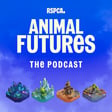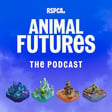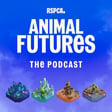
Why do we all need nature?
Steve Backshall MBE has loved nature from almost the very first moment he could move around.
Since then, nature has given him a career - but also remains one of his favourite ways to spend his spare time, to support his wellbeing and to enjoy life with his family.
But why is nature so important to him, and his children? And how can it compete with the television screens and smart phones always vying for our attention?
Host Kate Quilton chats to the TV presenter, naturalist and broadcaster about his enthusiasm for nature, sharing the importance of the outdoors with others, and what the future may hold for the natural world and wildlife - both in England and Wales, and further afield.
Steve also considers whether there is a tipping point that could encourage society to take nature more seriously - and swing people's perspectives to live their lives in a way that is kinder to all animals. He also talks about why we need to ensure nature feels accessible to people from all walks of life.
The Animal Futures podcast is part of the RSPCA Animal Futures Project, which explores five possible scenarios of what the world could be like for animals in 2050. People can have their say on the future of animal welfare by joining The Big Conversation, and by playing the RSPCA’s Animal Futures game.
Host: Kate Quilton
Guests: Steve Backshall, MBE
Produced by: Mark Adams, Chris O'Brien, Emily Prideaux and Jo Toscano.
Animal Futures Project: https://www.rspca.org.uk/whatwedo/latest/animalfutures
Animal Futures Game: https://www.rspca.org.uk/webContent/animalfutures/
Animal Futures: The Big Conversation: http://rspca.org.uk/bigconversation



